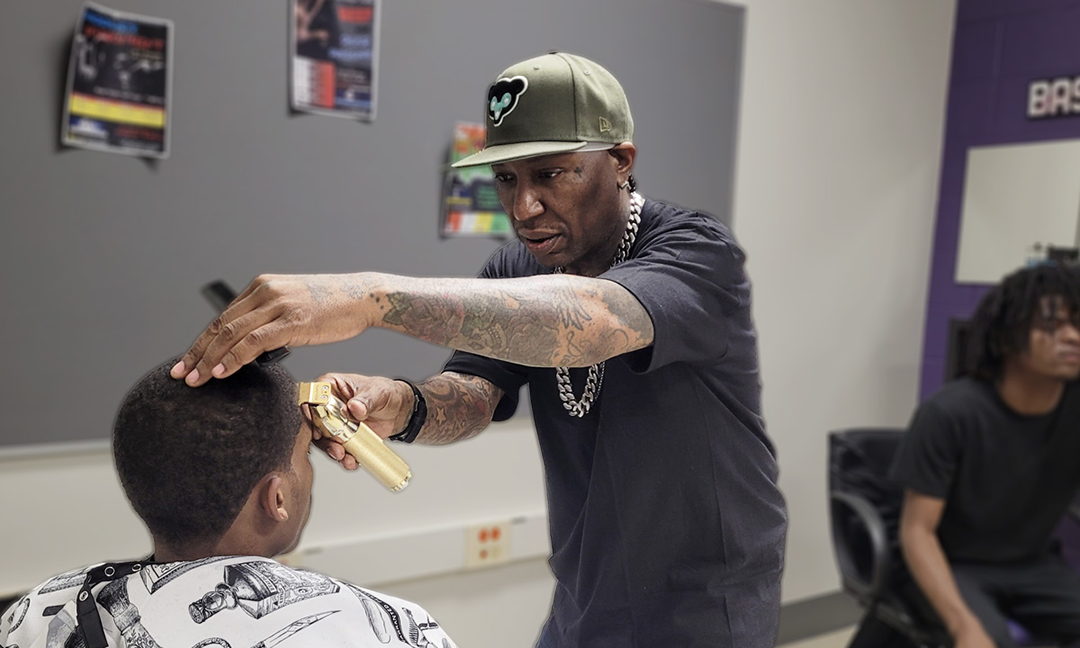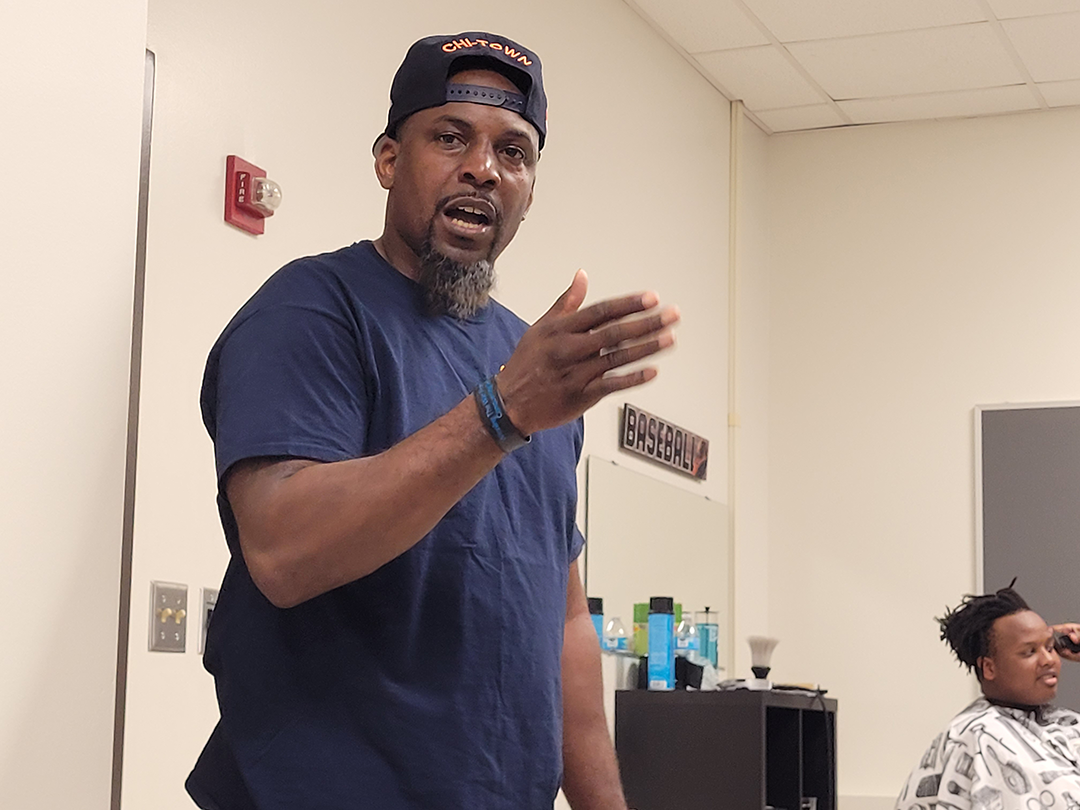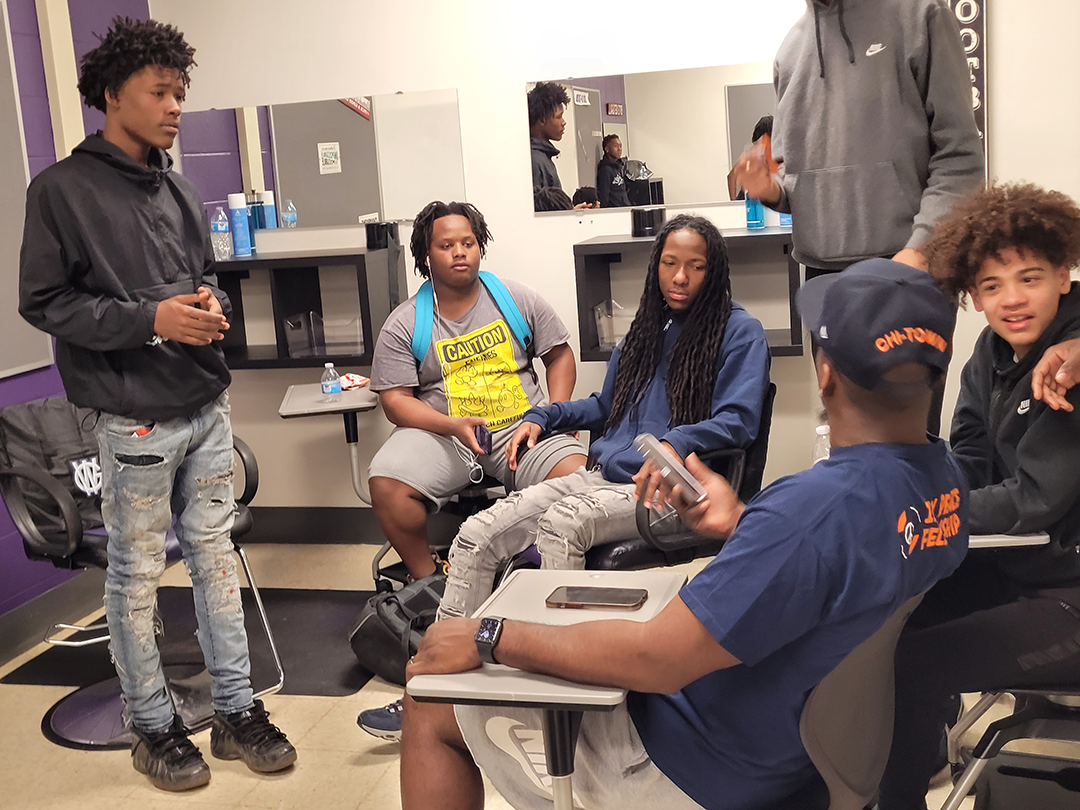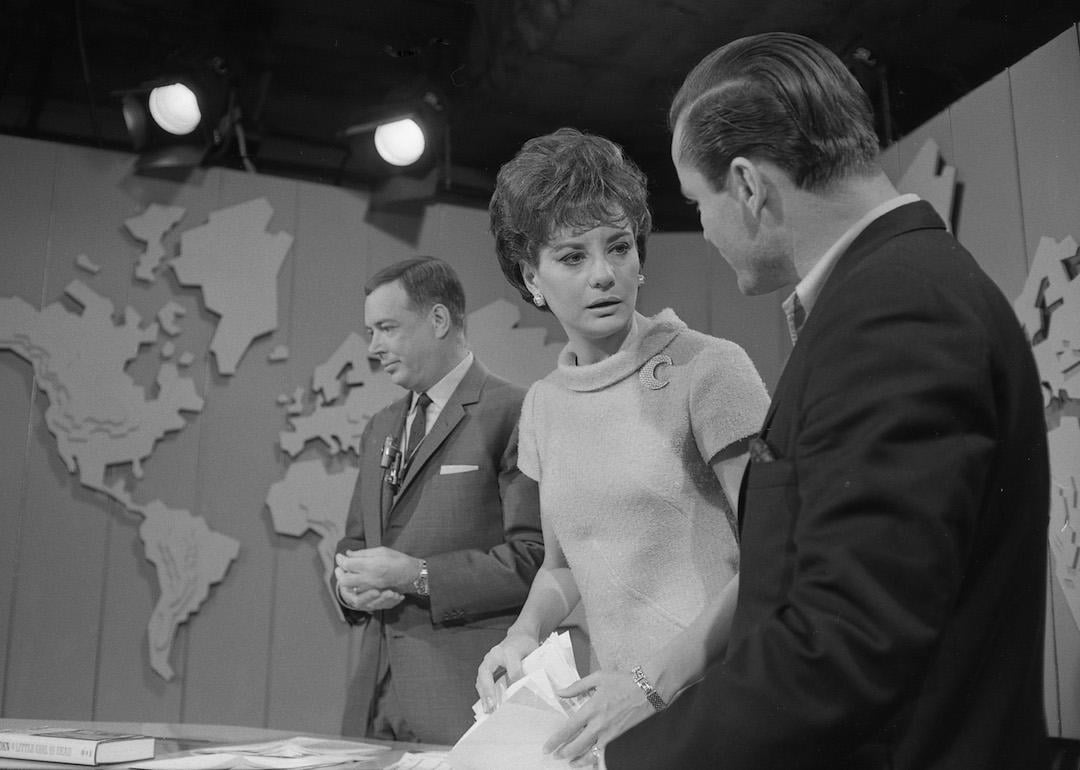
How 'Barbershop Talks' help one school offer counseling and mentoring
How 'Barbershop Talks' help one school offer counseling and mentoring
Derrick Mcatee flips the "on" switch of his electric clippers as a student settles into the barber chair in the basement of George Washington High School in Indianapolis.
The clippers start to buzz as Mcatee looks out at the dozen other students in the room.
"What's the biggest peer pressure you think y'all facing right now?" Mcatee asks.
The students, all Black or Hispanic males, gather each Wednesday morning with Mcatee, local activist Antonio Patton and sometimes other barbers or guest speakers for the school's new "Barbershop Talks" program — an anti-violence, mentoring and counseling effort building on the trusted relationship between haircutters in the Black community and their male and female clients.
Frank discussions that can be spontaneous as clients sit in the barber's chair have grown increasingly formalized as haircutters also connect clients to health services, are on the lookout for signs of domestic violence, and train to be mental health counselors.
Patton and Mcatee have been at the school weekly since October at the request of Principal Stan Law. Mcatee and visiting barbers cut hair while the students, two of whom report having been shot previously, talk about challenges they face. Mcatee and Patton offer insights in return about how to handle stresses and to de-escalate tensions before they turn violent.
Mcatee's question about peer pressure during a visit by The 74 on this day in April draws a flood of answers: Drugs, girls, people picking fights on social media, and one response that highlights the stakes at play clearly:
"I just feel like the biggest peer pressure for me is just like making the right decisions, like doing the right thing," said Xavieon Wilson, 15. "The other day I had a choice. I could have went with a group of friends and did something not so good or I could have went to a workout. I went to a workout and one of my friends ended up being shot."
"Wow," Patton said, asking if the person died. (He survived.)
"That's a smart decision," added Mcatee, who was shot as a bystander in his teens and wants to help others avoid that kind of danger. "You see the outcome of it, right? That's just being smart."
The program at the school grew out of community-wide barbershop talk sessions Patton and his non-profit group Men of Vision Empowering (MOVE) started scheduling in shops across Indianapolis in 2022 in an attempt to reduce violence, domestic abuse and other social problems.
Similar efforts are happening in barbershops in cities such as Atlanta, Philadelphia, New York City, New Orleans and Washington, D.C.
As Patton's effort's drew attention, Principal Law invited Patton to adapt the talks to his school, which is 84 percent Black or Hispanic and where two thirds of students are considered economically disadvantaged.
The school is also in the Haughville neighborhood of Indianapolis, long regarded as one of the most dangerous in a city setting a new record for homicides in 2020, then broke it again in 2021 before easing last year.
"There is a grave need for black male scholars to engage with older, caring, and relevant black males who have a story of perseverance and triumph over challenges that the scholars can relate their current experiences that affect their lives," said Law.
"A barbershop motif provided the platform to help our young men make connections with real stories with real experiences with real solutions," he added.
Guests have included former Indiana Pacers basketball player George Hill, who grew up in Indianapolis, and people from the school's neighborhood who were in trouble as teens but found successful jobs and lives.

Combatting peer pressure
The peer pressure question on this day continued to draw responses. Dae'den Thompson, 16, said he feels pressure when two friends have a conflict and he has to pick a side.
"Do you know how many beefs I've managed?" asks Mcatee, who has worked at multiple barber shops in the city. "The best thing to do is stay out of it. You say 'I got love for you' and 'I got love for you.' The best thing you can do is try to bridge it if you can."
He tells students that sometimes having friends talk, without others around that they have to show off for, can defuse a problem.
"Once they really get there and talk, man, a lot of that stuff don't be about nothing," he said. "They really don't want to beef."
"They do it when they get around a friend," a student said.
"That's it," said Mcatee. "That's the only reason that they do it."
For the next hour, the conversation bounces from cyberbullying to materialism, absentee fathers, letting slights go and not seeking conflicts over money or property damage that could lead to violence. At other points they joke about girls, about embarrassing moments or about going to prom as a group.

Making an impact
Thompson and other students say they appreciate the program for a chance to talk with students and adults who understand their lives.
"I come here and can speak my mind," he said.
Law says the talks seem to be having an impact. He did not have data, but said behavior problems with participants has fallen and attendance has improved. That's in keeping with results from a study in Philadelphia that showed young adults had fewer fights for a few months after participating in barbershop discussions. Those results didn't last, however, and the program at George Washington is too new to know the long-term effect.
The biggest impact Patton hopes for, though, won't be measurable. It's about preventing tragedy.
"I'm tired of meeting moms screaming for their babies that's never coming home," Patton tells the students. "I do not want to see one of you young men on the news other than being highlighted for something amazing."
This story was produced by The 74 and reviewed and distributed by Stacker Media.



